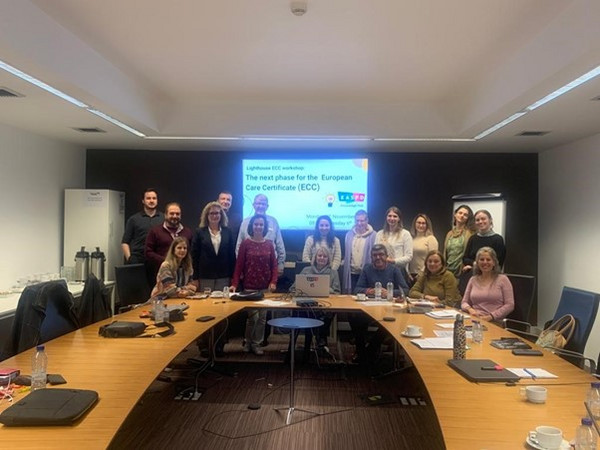European Care Certificate Training

The Member Forum on Workforce Development and Human Resources aims to promote high standards of knowledge, skill, competence and understanding within the social care workforce of the EU in general and amongst those of EASPD members in particular as a means of delivering quality services.
The European Care Certificate (ECC) was developed by EASPD in partnership with organisations active in the social sector from 17 European countries. ECC is a Europe-wide qualification which covers the basic knowledge that is required for an individual to work in a health and social care setting. The ECC is aimed at trainers, employers and staff in the sector. James Churchill, EASPD board member and co-chair of the Member Forum of Workforce Development and Human Resources, is the founder of the ECC. The focus of the training was to introduce new stakeholders to the ECC, update lead partners on key developments in ECC content, and to discuss strategic plans for the future of the ECC. It brought together a group of stakeholders from the ECC, including the lead partners from Bulgaria, Italy, Greece, Spain, and Portugal. It was also attended a delegation from Mental Health for Ukraine (MH4U), a Ukrainian organisation who want to investigate how the ECC could support care workers in Ukraine.
The training covered a lot of ground over the two-day period. Day one opened with an introduction to the ECC and its history. This was followed with an overview of the topics of the Basic European Social Care Learning Outcomes (BESCLO) which underpin the ECC training and exam. EASPD E-Learning Officer Kalianne Farren gave a demonstration of the ECC MOOC, an online course that prepares you to take the ECC exam. The course is available to all, for free, on the EASPD Knowledge Hub. The second day was focused on the strategic development of the ECC. Attendees discussed proposed updates to the ECC learning material and question bank. The question on certification was discussed, as well as the expansion of the ECC to new countries. The topic of translation was also raised, as a consequence of the newly planned materials in the ECC course and exams, such as GDPR and inclusive technologies.
Participants were very satisfied with the training, learning and providing new ideas and innovative ways to promote the ECC both in their own countries and beyond. They commented on how the Lighthouse Network had given them the rare opportunity to discuss the ECC in person, a setting in which collaboration is much more effective. They looked forward to actioning the ideas they brainstormed over the two days of the training.

